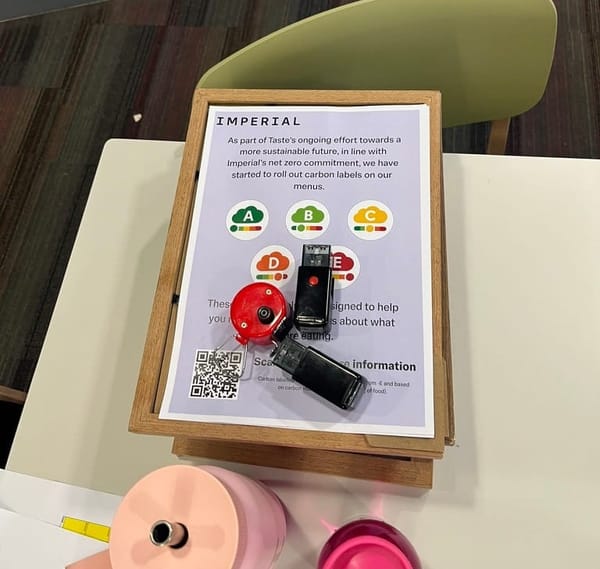250 connections between Imperial and fossil fuel companies
Imperial Climate Action compiled a database of ties between fossil fuel companies and the College
Imperial Climate Action (ICA) compiled a database of Imperial’s ties to fossil fuel companies in March 2024. A group of volunteers searched Imperial’s website for any mention of these companies, finding 250 relationships.
“It was clear anecdotally that there were many connections between Imperial and fossil fuel companies, and we wanted to quantify that relationship in a clear way,” said John*, an ICA member. ICA is a group students, staff, and alumni who seek to motivate the College to act on the climate crisis.
Dating as far back as 1987, the connections ICA has found between Imperial and these companies include grants and funding as well as connections to staff. The volunteers used a web crawler to search Imperial’s website for mentions of large fossil fuel companies, including BP, Shell, Chevron, ExxonMobil, and Petronas. Then, they removed duplicates and double-checked each entry was accurate. Finally, they wrote plain language summaries of each relationship, which have now been posted to the ICA website.
“Our goal is not to point blame at any particular person, which is why we almost always removed the names from our summaries,” explained John. “Instead, we want to highlight the depth of the connections between Imperial and fossil fuel companies that represent a meaningful percentage of all global emissions ever.”
Carbon Majors found 36 major fossil fuel companies are responsible for more than half of the global carbon dioxide emissions in 2023. Carbon Majors is a historical database providing emissions data for the world’s 180 biggest fossil fuel producers. ExxonMobil, Chevron, and Shell are among the top emitting fossil fuel companies on the Carbon Majors database.
“Working with fossil fuel companies that continue to deny science and delay much needed progress, actively harms the College’s academic credibility, as well as influencing research outcomes,” said John. The College uses the Imperial Zero Index (IZI) to decide which fossil fuel companies are in line with their Sustainable Imperial Strategy. Imperial only works with these companies on projects that are related to decarbonisation.
A 2020 report from the Corporate Mapping Project and the Parkland Institute found that government and corporate funding is invested more in fossil-fuels-related research, and that research related to renewable energies and energy efficiency is underfunded. The report found this pattern in grant funding, and the establishment of research chairs and institutes.
Similarly, a 2022 study published in Nature Climate Change found that “energy centres heavily funded by fossil fuel companies write text that is significantly more positive in mentions of natural gas.” Similar findings are reported in Merchants of Doubt by Naomi Oreskes and Erik M. Conway, which documents how fossil fuel companies pushed to convince policymakers the climate isn’t changing using some of the same strategies and scientists who denied tobacco was harmful.

Imperial’s partnership with BP and reserach outcomes
Another ICA member, Alex*, noted that Imperial collaborates with companies that have historically invested in campaigns to maximize oil and gas production, and recently withdrawn from climate commitments and the Science-Based Targets initiative, and abandoned renewable energy projects in favour of fossil extraction.
“Imperial management presents the university as a climate leader, while at the same time researching ways to maximize fossil fuel extraction paid for by companies who have promoted science denial and lobbied governments against climate action,” said Alex.
In 2019, the Imperial’s News website published a piece “celebrat[ing] Imperial’s prosperous relationship with BP.”
“BP’s collaboration with Imperial College London has shaped research programmes, facilitated industry-academia debates, and involved testing novel approaches to new disruptions,” reads the article. “In the past five years alone the partnership has resulted in the co-authorship of 23 journal and conference papers and strong connections with academics from nine of Imperial’s departments.”
Imperial and BP have conducted research in advance materials research and energy storage. Some students are still concerned by the partnership.
“Universities have been a target for fossil fuel companies for decades,” said Alex. “[This] has created a reliance on them for funding and provided opportunities for the industry to access students [to] encourage and perpetuate their destructive business model.”
“Greenwashing” how fossil fuel companies strive to improve their public image
Greenwashing is a marketing strategy where a company misleads the public into believing that it is more environmentally friendly that it truly is.
“Fossil fuel companies rely on a ‘social license’ to operate. This means that they need to be seen by the public as essential and beneficial,” said Alex. “Universities like Imperial help with this strategy by presenting them as part of the solution, whilst they abandon climate targets and their wealth [of] expertise [on] renewable energy, and scale up fossil fuel extraction. This amounts to greenwash.”
Greenwashing is used to undermine efforts to address the climate crisis and reduce emissions. These deceptive claims risk discouraging action to address the climate crisis, according to the United Nations Climate Action website.
“Any fossil fuel company that is planning any new extraction or [to] increase production is not aligned with keeping warming well below two degrees,” said John, referencing the temperature target set by the Paris Agreement. “The idea that somehow these companies are making a valiant effort to transition [and] that we should help [them] is ridiculous after the last 50 years of science denial and misinformation.”
ICA hopes to highlight ties between Imperial and fossil fuel companies.
“I hope it empowers us to ask questions in two broad categories,” said Chris*, an ICA member. “One, what kind of bias does this lead to, when these companies enable only particular questions to even be researched; and, two, what is it about the state of research funding that means we are not empowered to work with much better partners to get funding and collaborators?”
“Fossil fuel companies are harming our health and the health of our children, so we need to stop working with them,” said John.
*Names have been changed for anonymity.










